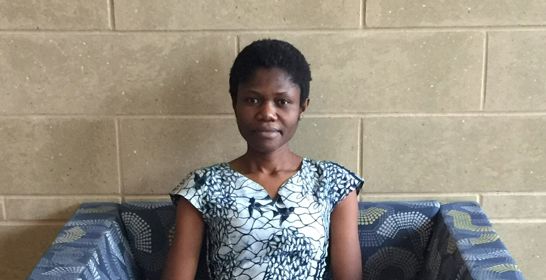
Don’t miss out on new resources
Please join us as we – together with our partners – chart new paths toward a healthier world. Sign up for our newsletter today.

The theme for this International Day of Women and Girls in Science is “Innovate. Demonstrate. Elevate. Advance. Sustain. (I.D.E.A.S.) – Bringing Everyone Forward for Sustainable and Equitable Development”.
In celebration, we asked Dr. Adwoa Gyamfi (PhD, MPH, BSc., RN, Post Graduate Certificates in Education, Clinical Genetics and Genomics), Postdoctoral Fellow at the University of Ghana and a 2022 Trainee Expansion Program Trainee Bridge Fund awardee, how her research into breastfeeding and breastmilk and her project, “Designing and testing a community-based lactation counselling model in Ghana: A Trial of Improved Practices”, might apply to this year’s theme.
Our conversation centered on her current work. Yet Adwoa’s perspective also incorporates her extensive clinical nursing and teaching experience in Ghana, plus her recent PhD studies on breastfeeding support among African American women in the United States, where she explored breastfeeding challenges through an equity lens and emergent forms of breastfeeding social support.
It is our honor to share Adwoa’s specialist insights in the Q&A below.
Adwoa, your current Trainee Bridge Fund (TBF) project involves designing and testing a community-based lactation counseling model in Ghana – what does the model entail, in practical terms?
Thank you. The model entails three phases, beginning with the identification of unmet needs in community-level breastfeeding counseling and support in rural Ghana. The second is capacity building of lay volunteers to be community-based lactation counselors and of public health nurses to be lactation counseling supervisors. The third phase will test the feasibility and acceptability of this model, using the Trials of Improved Practices formative research approach.
What do you hope to achieve if the project is successful, in Ghana and in other parts of the world?
The project seeks to establish a community-based lactation counseling model in two rural communities (both with limited access to facility-based lactation services in the Ashanti Region of Ghana) to facilitate improved knowledge and capacity for breastfeeding optimally. My hope is that such a model, if nationally implemented, may complement UNICEF’s Baby-Friendly Hospital Initiative to promote, protect and support early initiation of breastfeeding, and thus increase women’s confidence and competence in breastfeeding, the avoidance of formula, and exclusive breastfeeding.
Ultimately, I hope that the project can help improve the health of Ghanaian infants. Moreover, if the community-based lactation counseling model is successful, other lower-and-middle-income-countries may adopt it to achieve similar results. Hopefully, such outcomes will positively impact global exclusive breastfeeding targets of at least 50% by 2025 as proposed by the World Health Organization.
Could you give brief examples of how your project Innovates, Demonstrates, Elevates, Advances or Sustains (I.D.E.A.S.)?
The project, to the best of my knowledge, is the first community-based lactation counseling pilot project in Ghana. Considering there are no certified lactation counselors or specialists in Ghana, training public health nurses at a high level for breastfeeding is an innovation here that can advance practitioner competence and fill an important gap. Furthermore, the additional step to include lay volunteers in the model may elevate breastfeeding support in Ghana and improve breastfeeding rates.
Importantly, pregnant women and nursing mothers will have access to improved lactation promotion services where they live. The lactation services will be at scheduled periods and whenever necessary, complete, and individualized to meet participants’ needs – unlike the prevalent lactation services in Ghana. Therefore, a community-based lactation counseling model which will be integrated into the primary healthcare system of Ghana may not only advance but help sustain optimal breastfeeding through evidence-based knowledge.
How does being a TBF awardee facilitate your ability to generate the project ‘I.D.E.A.S.’ that you described above?
The TBF grant makes it feasible to receive the most effective and efficient support, inclusive of funds and mentorship, to implement the I.D.E.A.S. I described. The grant covers a one-year timeframe, which is needed to conduct this three-phase project. Formal training of lay volunteers and nurses will take time, as will the feasibility testing.
The TBF grant also provides an opportunity to collaborate and learn with mentors Prof. Richmond Aryeetey, PhD, MPH (University of Ghana) and Dr. Amber J. Hromi-Fiedler, PhD, MPH (Research Scientist, Yale University). Both are experts in their fields, and I look forward to this developmental experience together.
The UN says “science and gender equality are both vital for the achievement of the internationally agreed development goals, including the 2030 Agenda for Sustainable Development”. How could today’s scientists contribute to bringing about such equality?
Scientists should make conscious efforts to embrace diverse genders in their fields. Opportunities for improvement could be the early introduction of different fields in science to all genders through school, for instance. Philanthropies and public institutions could expand opportunities (e.g., via scholarships and grants) for gender minorities. Furthermore, increased publicity for scientific contributions from gender minorities could both bring science closer to those groups and serve as an inspiration, demonstrating what is possible to achieve.
What advice would you offer to a girl who is interested in following a similar career path?
A career path in human milk and lactation research is rewarding, diversified and has significance for several generations! So keep the dream alive, work at it and you will soon join the “bigger family”!!